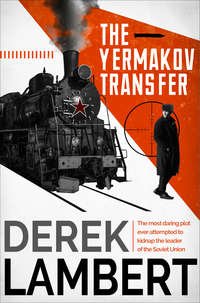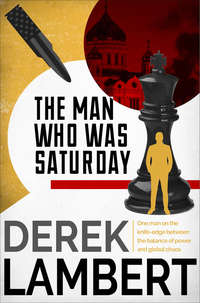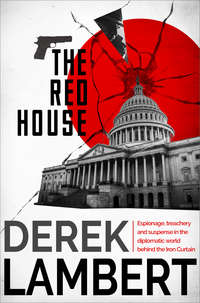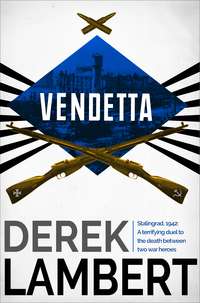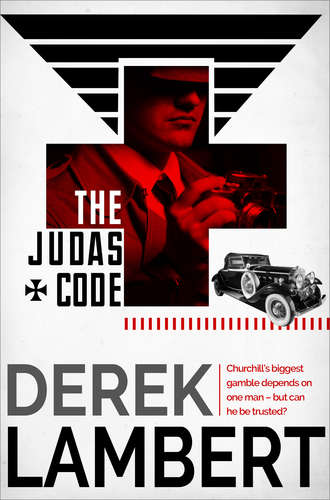
Полная версия
The Judas Code
But he had soon sickened of this. He wanted no more contact with spies or men who would offer him 5,000 escudos to help them jump the queue in the American Export Line offices. He wanted to help the helpless, that was why he had joined the Red Cross.
And, although he was only twenty-two, he had grown old with them.
As he made his way across the Praça Rossio, the city’s main square, he could hear firecrackers exploding like gunfire. He stopped and bought a red carnation, its stem wrapped in silver paper, from the flower-seller beside the fountains, to give to the girl whose name was Candida. She was slumbrous and warm-limbed and she would cut the stem off the carnation and wear the flower in her hair that shone blue-black in the sunlight. Hoffman wasn’t in love with her which he thought was a pity.
He left the square and turned up the Rua da Madalena, intending to climb towards the ramparts of the Castelo de São Jorge, St George’s Castle, which stands astride one of Lisbon’s seven hills. Or was it eleven, or thirteen even? The travel guides begged to differ; Hoffman thought it was typically Portuguese, unaware, because he was young, that practically nothing is typical.
He was also unaware that he was being followed by a man carrying a gun, a Russian-made automatic pistol, in the pocket of his raincoat. The man had puffy features and a fleshy nose and he walked as though the pointed brown and white shoes he was wearing hurt his feet; in normal times the heavy gaberdine raincoat and wide-brimmed hat would, together with the shoes, have been conspicuous on a hot evening, but not these days when it was common enough to see a Bohemian or a Slovakian in outlandish clothes hurrying to some secret rendezvous.
Hoffman turned left and began to climb, the walls of the castle ahead of him. He was early for his appointment and intended to spend ten minutes or so wandering around the battlements of the castle with their sensational views of the city and the Tagus.
The man with the pointed shoes followed.
Absorbed with the thought of the pleasures to come that evening, Hoffman almost collided with a woman carrying a basket of fruit on her head; she cursed him but kept her balance with dignity. A procession of children in national dress scattered as a firecracker thrown by an urchin fell hissing in their midst; when it exploded everyone screamed delightedly.
The man in the pointed shoes felt the gun in his pocket, crooked his forefinger round the trigger. The gun felt hot and heavy, like himself. Why couldn’t they have given him an older quarry instead of a mountain goat? Hoffman didn’t have the build of a natural athlete, but he was slim and supple.
Hoffman strode along a short street lined with linden trees and entered the castle grounds. The castle was Phoenician and Moorish and Christian; apart from the walls there wasn’t much of it left.
In a dusty clearing just past the gates teenage girls were performing an impromptu folkdance. They wore long skirts striped in green and gold and red, white blouses and green and red headscarves. A woman spectator bursting with knowledge told Hoffman that they were from the north, affronted that feira in Lisbon was such a discreet affair.
Not in the Alfama, he thought: nothing was ever discreet down there. He walked over to the stone parapet and gazed down at the labyrinth below, rooftops like a discarded pack of mildewed playing-cards. So closely were the hillside terraces packed, so sturdily were they planted, that they had resisted the earthquake which devastated the rest of Lisbon on All Saints’ Day, 1755, and the tidal wave which had followed it. Down there every day was feira.
The man with the pointed shoes moved nearer, paused. He hadn’t expected Hoffman to come to this public place. Indecisively, he turned and looked at the dancers tripping about self-consciously in front of a statue. He put his free hand into the other pocket of his raincoat and fingered the purchase he had made that morning, a dozen firecrackers.
Hoffman gazed across the city and the Tagus, called the Straw Sea, because it was often gold at sunset. It was gold now. So broad was the estuary that visitors often thought that the open sea lay to the left of the city whereas, of course, the Atlantic lay to the right through a narrower channel.
Hoffman walked on towards the remains of the fortifications. Apart from the girls dancing it was aloof from the festival up here. You could feel space. A few Americans carrying cameras strolled the ramparts. Hoffman thought that there would be Americans at the Day of Judgement taking pictures.
He knew one of them, a rangy young man from the American Consulate, who did his best for the endless queue seeking visas to the United States. It was a hopeless task but at least he was polite and he treated all the old ladies as he would treat his mother.
He pointed at the ships becalmed in the golden waters and said: ‘Kind of hard to believe that Europe’s in flames, isn’t it?’
Hoffman asked: ‘Has Paris fallen?’ The American, whose name was Kenyon, knew about such things.
‘Not quite, but it’s there for the taking. Tomorrow, I guess. Then France will quit. The only neutral countries in Europe will be Switzerland, Sweden, Spain, Turkey, Ireland and, of course, Portugal. And Britain will stand alone. But not for long unless some sort of miracle occurs.’
‘Churchill talks in miracles,’ Hoffman said. ‘Dunkirk was a miracle.’
‘A miracle? Perhaps. It was a retreat just the same, a defeat. That’s the kind of miracle they can do without.’
‘I suppose,’ Hoffman said, choosing his words, ‘the sort of miracle they need is American intervention.’
‘Fat chance,’ Kenyon said. ‘Last year Roosevelt promised that there would be no “black-out of peace” in the States. If he does decide to stand for a third term he can hardly go back on his word.’
‘But if and when he does become President again?’
Kenyon shrugged. ‘Perhaps, who knows? But it may be too late. No, Churchill will have to pull that miracle first, and not just with words. If he doesn’t, then one day the whole world will be full of refugees.’
A firework fizzed and exploded. A small boy watched artfully from behind a pillar. Behind him Hoffman caught sight of a man wearing a raincoat and a broad-brimmed hat. He had a lost air about him; a refugee probably. He turned to look at the decorative birds pecking the dust and Hoffman forgot all about him.
The birds were either black or white, the colours of Lisbon’s mosaic pavements. There was even a white peacock.
Hoffman glanced at his watch. In five minutes’ time he was due to meet Candida Pereira. He bade farewell to the American and retraced his footsteps. They would have some bacalhau, cod, served with baked potatoes, onions and olives and one of the honey-sweet desserts washed down with a bottle of vinho verde, and then … well, they might dance in the streets, carouse … and then …
Hoffman walked quicker.
So did the man in the pointed shoes, wincing with each footstep. But at least they seemed to be heading for the teeming streets of the Alfama which was where he wanted Hoffman.
Hoffman plunged into the maze like a rugby player into a loose scrum. Above him the rooftops reached for each other; from the walls hung pots of pink and red geraniums and bird-cages from which only the song of the captives escaped. From the dark mouths of bars came shouting and laughter and music, sometimes Tommy Dorsey or Bing Crosby on scratched phonograph records, sometimes the fado, the lament of Portugal.
He stopped at the foot of a flight of steps named Beco do Carneiro. Old hands still got lost in the Alfama. He turned and, over the heads of the crowds, noticed a broad-brimmed hat glide into a doorway. But it didn’t really register; he was imagining the invitation in the slumbrous eyes of Candida Pereira and was by now alarmed that he might be late. However slumbrous their eyes, the Candida Pereiras of this world didn’t wait around.
He hurried on, emerging eventually in the Largo de Santo Estevão. He had come a long way round but it wasn’t far now.
Near the café where they had arranged to meet, the scene was particularly boisterous. A group of men who looked like American gangsters’ barbers were singing lustily, children were wrestling and from the windows above women were shouting across the street.
The man in the pointed shoes took the firecrackers from his pocket. He gave three to children and told them to light them and throw them.
He moved up closer to Hoffman and, reluctantly, let go of the butt of the automatic. He lit three more firecrackers – Whizz Bangs they were called – and threw them just ahead of Hoffman. As they landed the children’s firecrackers exploded, cracks as loud as pistol shots in the cramped space.
He returned his hand to his pistol pocket and through the gaberdine aimed the barrel at Hoffman’s back. He waited for his own Whizz Bangs to detonate, finger caressing the trigger.
The three explosions were almost simultaneous. In fact everything happened at once. The shoulder charge that knocked Hoffman sprawling, the explosion behind him, the screaming.
When he got to his feet Hoffman was surprised to see the man he had noticed wearing the broad-brimmed hat in the grounds of the castle lying on his back, brown and white shoes pointing towards the sky.
*
‘What I don’t understand,’ Hoffman said, ‘is how you just happened to be there at the right time.’
The sun-tanned man in the navy-blue lightweight suit said: ‘We didn’t just happen to be there. We had been keeping tabs on the man who tried to shoot you.’
‘Shoot me? Why should he want to shoot me? Why should anyone want to shoot me?’
The man who had told him his name was Cross – ‘Double-cross’, with the mechanical laugh of one who had made the joke many times before – said: ‘We rather hoped you would be able to tell us that, Mr. Hoffman.’
Us? There was only Cross present; although in the Alfama earlier there had been two of them.
As he had picked himself up after the gunshot, one of the men – Cross, he thought – had thrust him through the throng and said: ‘Let’s get out of here before all hell breaks loose,’ and Hoffman had thought: ‘They must know about me.’
If not, he reasoned as they hustled him down steps and alleys to a waiting car, they wouldn’t have been so sure that he would be willing to be bundled away from trouble.
Beside the car, a black Wolseley, he had made a token resistance: ‘Before I get into that thing I want to know just who the hell you are.’
‘We’re from the British Embassy. We want to help you.’
And he had believed them. In the society in which he moved, British or American still had a reassuring ring to them.
‘Is the man who tried to shoot me dead?’
‘We think so.’
The car, with the second man, obviously junior to Cross, at the wheel, had taken them along the waterfront to an old, comfortable-looking block of flats in the Belém district, close to the Jeronimos Monastery.
The apartment itself, presumably Cross’s, was splendid. The living room was spacious and filled with light; the curtains were gold brocade, the chairs and sofas Regency-striped. Through the windows, before Cross drew the curtains, Hoffman could see the first lights of evening pulled across the Tagus.
Cross, who had identified himself as a second secretary at the British Embassy, was interrogating him in the nicest possible way. He held up a cut-glass decanter and said ‘Scotch?’ as if there could be any other drink.
Hoffman shook his head; Cross made him feel immature, and yet Cross couldn’t have been all that much older. Twenty-five perhaps, but contained and assured – some might have said condescending – in the way of some Englishmen; those, Hoffman divined, who were not quite of the noble birth to which they aspired, but formidable just the same. And well-heeled because few diplomatic services, least of all the British, would provide a twenty-five old employee with a flat as luxurious as this.
‘Well, I’m going to have one. Are you sure you won’t have a wee dram?’
‘No, thank you,’ sitting back to study Cross as he poured himself a drink.
Hoffman had met quite a few Englishmen since he came to Lisbon but somehow this one didn’t quite fit. He was elegant enough, suit not too keenly pressed, striped tie deliberately askew; his manner was languid, his smooth hair was a warm shade of brown and his features were handsome in a military sort of way. Odd, then, that he wasn’t in the Army. Hoffman could sense contradictions about him and they bothered him.
The sun-tan, for instance; diplomats were never bronzed. And his hands were too big, strangler’s hands, making an absurdity of the white silk handkerchief tucked in the sleeve of his jacket. Hoffman couldn’t imagine Cross playing the English game of cricket; blood sports would be more his line. His voice was modulated but controlled; when Cross appeared to be wasting words he was wasting them for a purpose. No, Hoffman thought, your appearance is camouflage; beneath those casual graces lurks a hunter.
Glass in hand, Cross walked to a coffee table standing in front of a coldly-empty marble fireplace and picked up a pistol. ‘Taft, the man who drove us here, took it out of the pocket of your assassin’s raincoat pocket. Would-be assassin,’ he corrected himself. He held the automatic by the barrel. ‘Crude but effective, as they say.’ He pointed at the letters CCCP on the walnut barrel. ‘No doubt where it came from.’ He sat on the sofa opposite Hoffman, still holding the gun.
‘Was he Russian?’ Hoffman asked.
Cross laid the gun on the striped cushion beside him and drank some whisky. ‘I think perhaps I should ask the questions,’ he said. ‘A rescuer’s privilege.’ He gave a cocktail party smile. ‘How long have you been in Lisbon, Mr. Hoffman?’
‘About a year.’
‘Czech passport, I believe. And you work for the Red Cross.’
Statements not questions.
Cross said: ‘When did you leave Czechoslovakia, Mr. Hoffman?’
‘In 1938, when the Germans marched into the Sudetenland.’
‘You were from the Sudetenland?’
Hoffman shook his head. ‘From Prague.’
‘Weren’t you a little premature in leaving?’
‘On the contrary, that was the time to get out, before the whole of Czechoslovakia was occupied.’
‘What language do you speak?’
‘English,’ Hoffman said.
Cross didn’t smile. ‘Your native language?’
‘Both Czech and Slovak and a little Hungarian.’
‘I wish I had your talent for languages,’ Cross said. ‘It’s not our strong point – we think everyone should speak English.’
Is he dead?
We think so.
So casual. The reply had barely registered. A man who tried to shoot me is lying dead in a Lisbon street or in a morgue and here we are discussing languages.
‘Did you leave anyone behind?’
‘Sorry, I don’t quite … I will have that drink,’ Hoffman said, ‘if you don’t mind.’
‘Not at all,’ in a tone that did mind just a little.
Cross poured him a whisky. ‘Soda?’
‘Please.’
He sipped his drink. ‘Did I leave …’
‘When you left Czechoslovakia, did you leave any relatives behind?’
‘Only my mother. My father died five years ago.’
‘Wasn’t that a little callous?’
‘She had married again. To a man who had all the makings of being a good Nazi when the Germans finally took Prague.’
‘And where did you go to?’
Hoffman, who felt that Cross knew the answer to this and most of the other questions, replied: ‘To Switzerland.’
‘How? Across Germany?’
‘Austria.’
‘Same thing by then.’
We think so. Hoffman took a gulp of whisky. ‘It wasn’t too difficult. I had forged papers and foreign languages didn’t surprise people in that part of Europe in those days. The Balkan tongues had spilled over …’
‘Why the Red Cross?’ Cross asked abruptly.
‘Should I be ashamed of it?’
‘It’s a dedication not a job. You were very young to choose a dedication.’
‘I knew what was happening in Europe. To the Jews in Germany. I knew what was coming. I wanted to help.’
‘But not to fight?’
‘Apparently you didn’t wish to fight either, Mr. Cross.’
Cross didn’t look as angry as he should have done. But the interrogation lapsed for a few moments. A ship’s siren sounded its melancholy note, bringing a touch of loneliness to the evening.
Cross poured himself another whisky. Then he said: ‘For a pacifist that was a very belligerent remark, Mr. Hoffman.’
‘Pacifist? I suppose I am. I happen to think I can do more good working for the Red Cross than becoming another freedom fighter.’
‘An unusual appointment, isn’t it? A Czech working for the Red Cross in Lisbon?’
‘On the contrary. As you know, the city’s full of refugees from central and eastern Europe. I can help them, we understand each other.’
‘Quite a cushy number,’ Cross remarked. Hoffman hadn’t come across the word ‘cushy’ but guessed its implication and guessed that Cross was trying to needle him. ‘Like mine,’ Cross added. ‘Did you go to Berne?’
‘Geneva. I spent a year there. I learned English there. Second secretary of what, Mr. Cross?’
‘Chancery,’ Cross said without elaborating.
The phone rang.
Cross spoke into the receiver. ‘Yes … He is, is he? … Yes, he’s here … No, we won’t … I won’t forget … I’ll ring you back.’
He replaced the receiver saying to Hoffman: ‘Yes, he’s dead all right.’
‘Do you mind if I ask a few questions?’
‘Fire away, but don’t expect too many intelligent answers.’
‘I presume you’re with British Intelligence.’
‘You may presume what you wish, Mr. Hoffman.’
‘Who was he?’
‘Your very-dead, would-be assassin? A man named Novikov.’
‘Russian like his gun?’
‘As far as we can gather. As you know Portugal doesn’t recognise the Soviet Union. But quite a few Russians managed to infiltrate during the Spanish Civil War when they were backing the Communists. They settled here with false identities and kept their heads down.’
‘And why were you following him?’
‘He worked as an interpreter – like you he was quite a linguist – and did a lot of work for us. But, of course, he was a Soviet agent. Who isn’t an agent of some sort or another in Lisbon these days? He was also a hit man,’ Cross said. A breeze breathed through the open window, ruffled the curtains and, with a tinkle, spent itself in the chandelier. ‘But we had penetrated his set-up and we got word that today he had a contract. We didn’t know who but it soon became obvious that it was you. Why, we didn’t know, still don’t,’ raising an eyebrow at Hoffman. ‘At one stage Taft and I thought he was going to clobber you in the castle grounds.’
‘Then why didn’t you try and stop him?’
‘We wanted to know where you were leading him and then perhaps why he was after your blood.’
‘Mistaken identity?’
Cross grimaced at such a preposterous suggestion. He picked up the automatic, pointed it at Hoffman and said: ‘Don’t worry, it’s not loaded.’
‘Never was?’
‘Oh, it was loaded all right. Taft took the bullets out.’ He aimed the gun at the window and pulled the trigger. Click. ‘There,’ he said.
Hoffman put down his glass; he wasn’t used to hard liquor and the whisky had affected his reasoning. There was a catalogue of questions to ask but he had to search for them.
‘Until today I was a stranger to you?’
‘Not quite. We make a point of checking out Red Cross personnel. I admire your dedication, Mr Hoffman, but it’s not unknown for a few devils to flit among the angels of mercy.’
‘But I—’
‘We just checked you out, that’s all. Any more questions?’
‘Why did you shoot him? It was you, wasn’t it?’
‘As a matter of fact it wasn’t. Taft did the dirty work.’
‘Did you have to kill him?’
‘He was going to kill you. Don’t let that dedication of yours blind you to reality.’
‘And you think you’ll get away with it?’
‘I’m quite sure we will. There are a lot of unsolved murders in Lisbon these days as I’m sure you know. The PIDE can’t follow up the death of every stateless mid-European. Perhaps he had stolen someone’s family jewels, their papers, their seat on the Clipper …’ Cross spread wide his hands. ‘My turn again?’
‘What more questions can there be? I don’t know why he tried to kill me, nor do you.’
Cross leaned forward, grey eyes looking intently at Hoffman. ‘Novikov worked for the NKVD. Have you really no idea why the Russian secret police should be so anxious to remove you from the face of this earth?’
‘No idea at all,’ lied Viktor Golovin.
CHAPTER FOUR
‘So,’ Churchill said to the tweed-suited man sitting opposite him on the lawns of Chartwell, ‘contact has been made in Lisbon?’
The man, who had fair hair needled with grey and a withdrawn expression that looked as though it had been recently but permanently acquired, nodded. ‘Some weeks ago.’
‘You didn’t inform me,’ Churchill said reprovingly.
‘With respect, Prime Minister,’ said Colonel Robert Sinclair, head of the Secret Intelligence Service, ‘you told me not to worry you with details. Only the grand stratagem.’
‘You’re right, of course.’ Churchill smiled at him brilliantly through the smoke from his cigar and the spymaster’s pipe. ‘I’ve had a few things on my mind recently …’
In the distance they heard the wail of air-raid sirens; then the alarm at Westerham groaned into life.
A few things on my mind, Churchill thought, and all of them disasters.
Since his becoming First Lord of the Admiralty on the declaration of war and then Prime Minister on May 10, 1940, after Chamberlain’s policies had finally collapsed, the Nazi jackboot had crushed most of Western Europe; now its toe was aimed across the English Channel at Britain.
Well, he had told the Commons three days after becoming Premier that he had ‘nothing to offer but blood, toil, tears and sweat’. But even he hadn’t anticipated the scale of the catastrophes that lay ahead in the next three months.
Now Britain stood alone. Hitler had, on July 16, issued a directive for an invasion. And, judging by the armadas of Messerschmitts, Dorniers, Heinkels and Junkers swarming across the skies, had every intention of carrying it out.
But had he? Wasn’t it more likely that the attacks were aimed at softening up Britain to induce her to make the sort of deal with Germany that Hitler had always dreamed about?
Indeed only three days after issuing the directive Hitler had told the Reichstag: ‘In this hour, I feel it to be my duty before my own conscience to appeal once more to reason and common sense in Great Britain as much as elsewhere …’
The Führer was dumbfounded by the stubbornness of the British people. Hurt, even, that they didn’t appreciate his benevolent schemes that would leave the British Empire, or most of it, unscathed.
No, Hitler’s heart wasn’t truly in the occupation of Britain: his ambition lay elsewhere – to the east.
And it was this belief that formed the cornerstone of the first phase of Churchill’s Grand Stratagem that had been gestating ever since he had first suggested to Brendan Bracken, two years earlier, that Germany and Russia should be manoeuvred into fighting each other to a standstill.
From the south there came the drone of approaching aircraft.
Clementine called from the house: ‘You’d better come in, Winston.’
Churchill who was wearing a painter’s smock and grey trousers pretended not to hear and shaded his eyes to look at the enemy squadrons. They were flying high in the summer sky in parade-ground order.
Churchill said: ‘I wish I had my field-glasses but if I go in to get them Clemmie will collar me.’
‘So she should,’ Sinclair told him. ‘We can’t afford to have our Prime Minister strafed by a Messerschmitt.’


